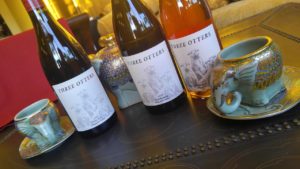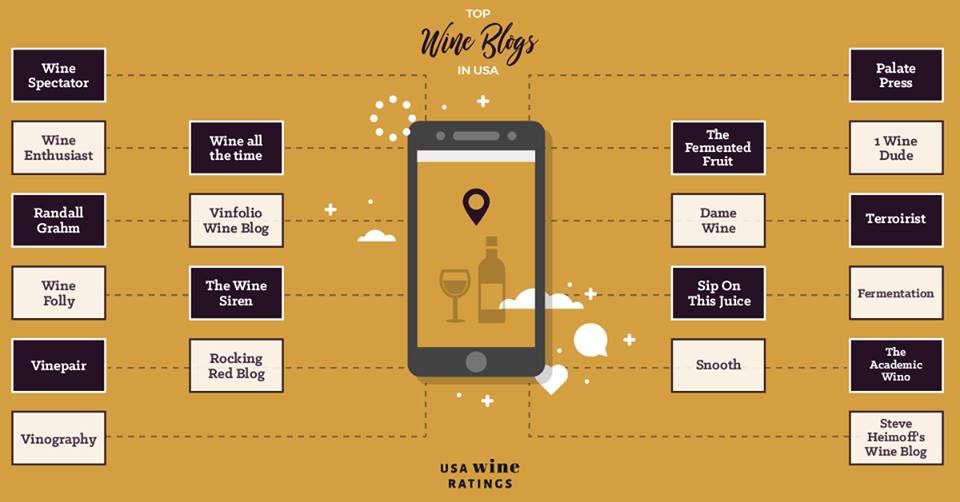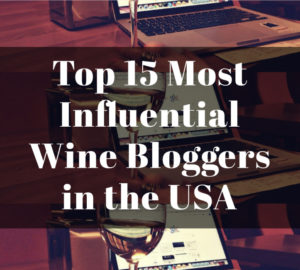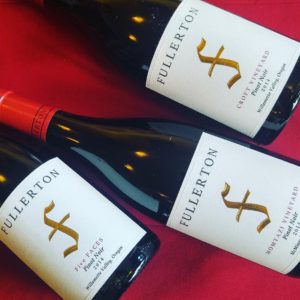 The vital need for art is not always as apparent as more practical things in life, such as the urgency for shelter, food and water or safety. We want to teach our children to focus on those things that help pay the bills and help us to survive. Unfortunately, that tendency to focus on survival skills often times sacrifices the teaching of how to nourish the spirit; we learn how to survive but we don’t learn how to live – to keep that inner light glowing.
The vital need for art is not always as apparent as more practical things in life, such as the urgency for shelter, food and water or safety. We want to teach our children to focus on those things that help pay the bills and help us to survive. Unfortunately, that tendency to focus on survival skills often times sacrifices the teaching of how to nourish the spirit; we learn how to survive but we don’t learn how to live – to keep that inner light glowing.
Fullerton Wines
In the summer of 2015, I went to my first Wine Bloggers Conference in the Finger Lakes region of New York State. One of the greatest aspects about the wine industry is meeting all the people involved, as most have usually had “another life” doing something else prior to joining the industry. One man I met seemed very earnest and forthright – I remember talking about why we started to write about wine, wanting to tell the human story associated with this special libation.
When he reached out to me a couple of months ago about tasting wines for an Oregon winery, Fullerton Wines, where he worked, I knew that I had to taste those wines because I remembered our conversations at the conference and I was confident that wines he represented would have soul to them. And they certainly were soulful wines on many levels, from their flavors to their story – a story that actually goes back to World War II.
The Pianist
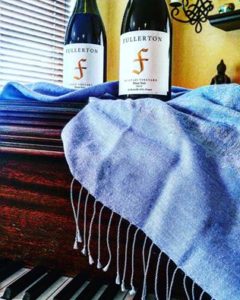 As I tasted these wines and read about the owner, Eric Fullerton, I could not help but think of The Pianist – a memoir and film (2002). Władysław Szpilman, a Jewish pianist for Polish Radio during World War II, tells his story of how he survived deportation to extermination camps, destruction of the Warsaw Ghetto and the 1944 Warsaw Uprising. It is a heart-wrenching story that shows the best and worst of humanity. There is one moment in his book, faithfully reproduced in the film, that plays over and over again in my mind – the moment when the reignition of a Nazi German officer’s soul helps save Szpilman’s life.
As I tasted these wines and read about the owner, Eric Fullerton, I could not help but think of The Pianist – a memoir and film (2002). Władysław Szpilman, a Jewish pianist for Polish Radio during World War II, tells his story of how he survived deportation to extermination camps, destruction of the Warsaw Ghetto and the 1944 Warsaw Uprising. It is a heart-wrenching story that shows the best and worst of humanity. There is one moment in his book, faithfully reproduced in the film, that plays over and over again in my mind – the moment when the reignition of a Nazi German officer’s soul helps save Szpilman’s life.
This special moment took place when Szpilman searched an abandoned building for food and was discovered by a Nazi German officer. The officer asked Szpilman what he was doing, to which he had no answer. The officer then asked him his occupation, to which he answered that he was a pianist. The officer then proceeded to lead him into a room that had a piano and ordered him to play. He played Chopin’s Nocturne in C Sharp minor. When he had finished playing, the officer asked him if he was Jewish, to which Szpilman replied yes. In that moment the officer had a decision to make – bring Szpilman to his superiors, or allow him to continue to hide. The officer not only decided to allow him to continue to hide, but he brought him food and drink, clothing at various times, etc., risking his own life in doing so.
What made this officer risk his own life? Was he a music lover? Was he a musician himself? We will never know for sure, but I like to think that maybe he was simply a human being forced into a terrible situation, and was inspired to find the strength to put his soul before his body.
Eric Fullerton
 During the summer of 1969, at the age of 14, Eric Fullerton’s wine journey began during a trip with his grandparents to the Boppard am Rhein in Germany. He met a woman who was one of the 15 Jewish refugees that his family hid and supplied with essentials until the end of World War II. On that trip he was first introduced to viticulture and winemaking and so, he now associates wine with people taking care of their community and lifting each other’s spirit.
During the summer of 1969, at the age of 14, Eric Fullerton’s wine journey began during a trip with his grandparents to the Boppard am Rhein in Germany. He met a woman who was one of the 15 Jewish refugees that his family hid and supplied with essentials until the end of World War II. On that trip he was first introduced to viticulture and winemaking and so, he now associates wine with people taking care of their community and lifting each other’s spirit.
After many years of learning about wines from around the world, Eric and his family found their home in Willamette Valley, Oregon. The wines and community inspired him and his wife to start a winery with their son Alex as the winemaker (their two other children are involved as well). The Fullerton family makes wines that express the values that were established when Eric had that special encounter at 14 years old.
“Life beats down and crushes the soul and art reminds you that you have one.” -Stella Adler
While life takes its toll on everyone, some are unfortunately put in impossible situations. But as life chips away, it is important to remind ourselves that good people are always on the same side, even if superficial labels try to divide us. That is why we can never take the need for art for granted. Those things that tap into our soul will not only carry us through our tough times but they will help us to recognize that precious being who needs our help – especially necessary when life blurs our vision.
************************************************
Samples Tasted on December 9th, 2016
Fullerton Wines were founded in 2012 by the Fullerton family and they source their fruit from Select Vineyard Partners and Estate Ivy Slope Vineyard. Their total annual production is 4,500 cases.
Fullerton Three Otters Wines
Three otters have been on the Fullerton family crest since the 13th century, and it not only represents the love for their family’s legacy of helping others but it also represents their passion for supporting organizations that protect these beautiful animals and their natural habitat.
–2014 Chardonnay: Citrus oil with mouthwatering acidity and a linear body that has great energy. A nice example which shows that US West Coast Chardonnay can make wines with lots of tension and restraint.
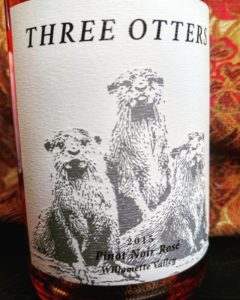 –2015 Pinot Noir Rosé: A real “chalky” quality that I also get from Sancerre Rosé, yet this has a more wild strawberry note. It reminded me of Grace Kelly – a wild streak bubbling underneath a controlled, polished exterior.
–2015 Pinot Noir Rosé: A real “chalky” quality that I also get from Sancerre Rosé, yet this has a more wild strawberry note. It reminded me of Grace Kelly – a wild streak bubbling underneath a controlled, polished exterior.
–2014 Pinot Noir: Smoky notes that are reminiscent of grilled portobello mushrooms, with kumquat flavors. A Pinot Noir with great sense of place and elegant fruit – a great value.
Fullerton Five FACES Wine
FACES is an acronym for the five Fullerton family members: Filip, Alex, Caroline, Eric and Susanne.
–2014 Five FACES Pinot Noir: This wine was absolutely delicious and drinking so well right now with a nice grounding in wet earthy undertones that were offset by tarragon and blueberry pie. Only 600 cases made.
Fullerton Single Vineyard Wines
Croft Single Vineyard has Bellpine and veins of Jory soil planted with Pinot Noir clones 115, Pommard and Wadensville. It is part of the Willamette Valley AVA.
-2014 Croft Vineyard Pinot Noir: Tight in structure in the form of fine tannin and lots of deep, dark fruit, finishing with hints of cardamom and cumin seeds that dance on the palate. I would highly recommend decanting to allow it to open. It will certainly improve with a few years of cellaring. Only 200 cases made.
Momtazi Single Vineyard has primarily sedimentary soil planted with Pinot Noir clones 113, 114, 115, 667 and 777. It is part of the McMinnville AVA and one of the first vineyards in the Willamette Valley to receive cooling winds in the evening. The McMinnville AVA is an American Viticultural Area located in Yamhill County, Oregon. It is entirely contained within the Willamette Valley AVA, roughly running from McMinnville to Sheridan.
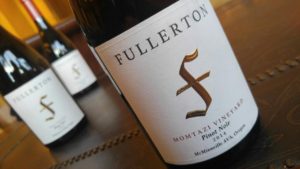 -2014 Momtazi Vineyard Pinot Noir: A stunning wine that has an ethereal nose with rose petal, crushed rocks and bright pomegranate flavor that are all expressive along the lengthy finish. This impressive wine will improve with cellaring, yet it is extremely tempting to drink now. Only 400 cases made.
-2014 Momtazi Vineyard Pinot Noir: A stunning wine that has an ethereal nose with rose petal, crushed rocks and bright pomegranate flavor that are all expressive along the lengthy finish. This impressive wine will improve with cellaring, yet it is extremely tempting to drink now. Only 400 cases made.

